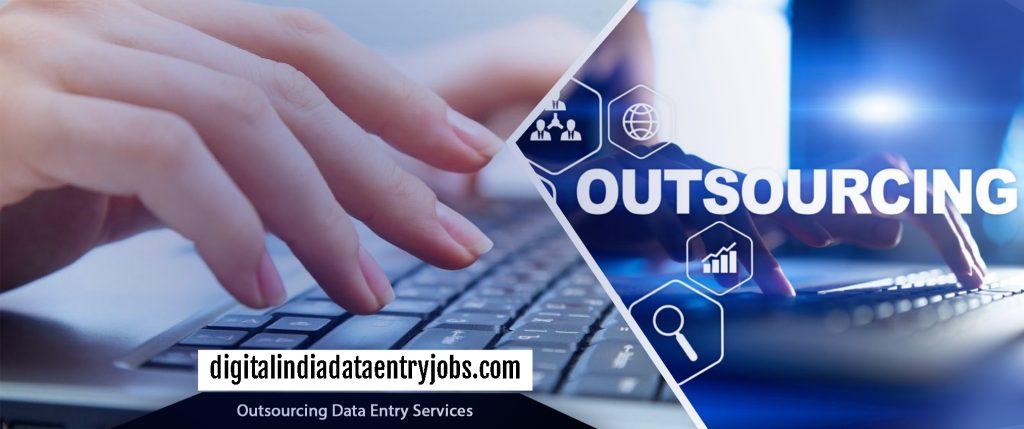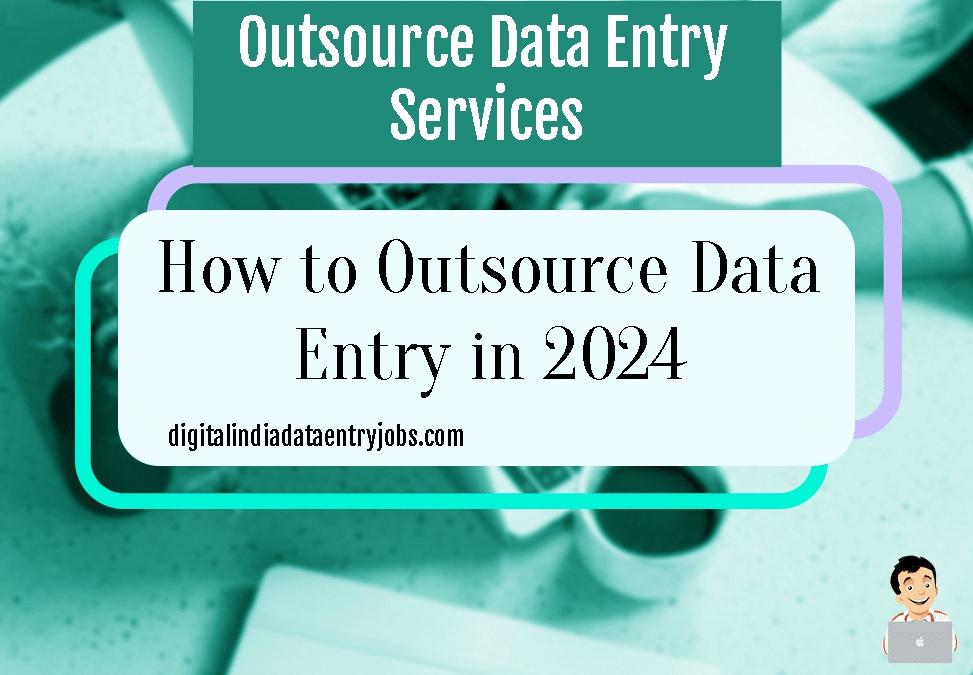Outsource Data Entry Services:- When working with financial data, data entry is one of the most fundamental yet essential duties for accountants and organizations.
Significant expenses and certain hazards, to which accounting companies and businesses are vulnerable, accompany this duty.
In this blog, we’ll discuss the advantages of outsourcing data input in 2024 as well as how to do it.
Contents
What Does It Mean Outsourcing Data Entry?
Outsourcing data entry is the practice of hiring a third-party organization to handle data entry tasks for your business, be it supply chain, finance, sales, accounting, or another area.
Your team can concentrate on its primary responsibilities by using this strategy to free up internal resources.
Through outsourcing, businesses can obtain specialized knowledge and cutting-edge equipment that is not accessible internally. By assigning the responsibility for data administration and accuracy to professionals, it guarantees high-quality data handling.
It can be less expensive to outsource since you won’t need to buy new equipment or hire more employees.
When the increase in workload is merely transitory or seasonal, it provides flexibility and scalability with your business demands.
Also Read:- Entry Level Data Analyst Jobs, scholarships gov, Mobilenumbertrackeronline

Things to Take Into Account When Hiring a Data Entry Outsourcer
Businesses that outsource data entry must take into account a number of important criteria to make sure the procedure complies with their security requirements and operational requirements. These factors aid in making a well-informed choice that will ultimately benefit the business.
Type of Data
Your best option for an outsourcing data entry service depends on the type of data you have.
Higher security standards and specialized handling are required for sensitive information, which includes financial and medical records, legal documents, patents, and trade secrets.
Due to confidentiality issues, such data might not be appropriate for outsourcing and should be managed within.
For example, financial data necessitates expertise in accounting and bookkeeping, whereas statistical data must be handled by trained statisticians in order to ensure correctness and integrity.
Volume of Data
Another important consideration is the freelancer’s or outsourcing company’s ability to manage the volume of your data. It is vital to have a conversation about their capacity to oversee the task at the intended speed.
Successful collaboration requires that the provider be able to match your demands, as not all of them have the same skills.
Cost-Effectiveness
It is important to compare the cost-benefits of outsourcing versus employing internally.
The average pay for data entry workers in the US is $43,458 a year, while in outsourcing hotspots like the Philippines, the rate can be as low as $300 per month.
Outsourcing is a financially appealing choice because of this notable difference, which can result in large savings.
But just because something is inexpensive doesn’t mean its quality is lower. Ask for a trial to determine whether it’s worth it.
Are you interested in learning data entry skills? For additional information, see our article.
Scalability
Companies have a vast pool of data entry clerks that can easily adapt to variations in workload, therefore outsourcing to them usually enables easier expansion. This configuration facilitates rapid scalability and internal information exchange, making it effective for increasing demands.
However, scaling with freelancers means hiring additional employees and training them one-on-one, which can take longer for companies with varying demands.
Expertise
With the staff and tools needed to handle different data entry requirements, outsourcing organizations frequently bring a wide range of experience to the table. It is crucial to confirm their experience, particularly with regard to your particular demands.
You must choose freelancers carefully to ensure they have the resources and expertise required for your project, even though they may be highly specialized. In highly specialized sectors, they might be the perfect fit for you, but scale issues could come up.
Types of Outsource Data Entry Services:
There are several ways to handle and process information effectively with the help of data entry outsourcing services. The nature of the service influences both the cost and the availability of personnel with the necessary skills. These offerings consist of:
- The process of converting text and numeric data from PDF files into digital formats so that they can be updated and accessed is known as PDF data entry.
- Information Copying and Pasting: Accurately transferring data across sources, appropriate for a range of documentation requirements.
- The process of converting various document types into digital data through the use of optical character recognition (OCR) technology improves accessibility and searchability.
- One way to use the data for reporting and analysis is to convert scanned PDFs into Word, Excel, or other formats.
- Data extraction for online databases refers to the process of extracting information from documents and moving it into online databases for efficient data management and retrieval.
- Indexing and Archiving PDF Documents: Using indexing to arrange PDF documents, make them readily searchable, and archive them for safe, long-term storage.

Also Read:- Remote Data Entry, Uidaionlineaadharcard, Companycontactdetail
Automating vs Outsourcing Data Entry: Differences, Pros and Cons
The use of automated data entry is an additional outsourcing choice. Automated data entry is the process of entering data using hardware and software. One example is to convert bank statements from PDF files to XLS or CSV using an OCR bank statement converter.
These are the primary distinctions between automating and outsourcing the data input process for your company.
Cost
The cost of automated data entry software, like an OCR bank statement converter, is about $39 per month. Compared to employing a data entry specialist from the Philippines, who could charge as much as $300 per month, this is far less expensive.
Automation is advantageous because it reduces the expense of manual data entry by providing a cost-effective solution for repetitive operations.
Efficiency
Outsourcing is common for manual data entry. Each financial document is processed by a human being on average in three minutes. OCR software, on the other hand, can process multiple documents at once and do so in around 20 seconds for each document.
Because automation improves productivity so much and can complete tasks faster than human processing, it is more advantageous.
Scalability
With time, and especially when workload grows, manual data entry becomes less efficient. However, automated methods keep processing times constant even when the volume of documents increases to one hundred or more. This makes the option of automated data entry more scalable for expanding businesses.
Accuracy
Automated data entry systems have an accuracy rate of up to 99.5%, whereas outsourced manual data entry can reach an accuracy rate of 95–99%. Automated systems’ accuracy reduces the possibility of mistakes, guaranteeing better data quality. In the bookkeeping profession, mistakes can result in significant financial losses, therefore making the right decision is also more economical.
Control
Direct contact and instructions are possible with data entry outsourcing, although delivery times may lengthen. Automated systems work according to preset parameters; they are less adaptable in the moment but provide a constant result without requiring constant supervision.
Flexibility
Although manual outsourcing is more costly, it allows for customization to satisfy project-specific requirements. Automated systems work with predefined algorithms; however, a lot of software may be tailored with extra features to fit certain requirements, making it an affordable and flexible alternative.
Security
Security issues differ amongst techniques. Local outsourcing businesses that abide by local regulations may provide greater responsibility and legal redress in the event of data breaches.
But when it comes to offshore corporations, your legal protection is severely limited.
Automated systems are susceptible to cybersecurity concerns; however, these risks can be mitigated and data protection ensured with the appropriate rules and procedures in place.

Conclusion: Outsource Data Entry Services
Finally, your company’s unique needs—cost, efficiency, scalability, accuracy, control, flexibility, and security considerations—will determine whether to automate or outsource data entry.
For repetitive processes, automation offers speed, consistency, and cost savings.
When it comes to complicated or diverse data management requirements, outsourcing offers flexibility and human insight. You may optimize your data entry process, improve operational efficiency, and efficiently secure your business data by considering these criteria and making the right decision.
Also Read:- Online Data Entry Jobs, Digitizeindiagov, Onlinereferjobs
FAQs On Outsource Data Entry Services
Q.) What is data process outsourcing?
Ans. Data process outsourcing is the practice of assigning data-related tasks, such as processing and management, to outside organisations. By utilizing cutting-edge technologies and specialized knowledge, this approach helps to optimize operations and boost effectiveness.
Q.) How does outsourcing data apply?
Ans. Outsourcing data refers to the practice of hiring outside service providers to handle, process, and enter data. As a result, businesses can leverage the knowledge and resources of specialized enterprises while concentrating on their primary business.
Q.) For what reason do businesses favor having data entry jobs outsourced?
Ans. Outsourcing data entry duties is a popular choice among businesses looking to reduce operating expenses, improve work quality through specialized skills, and increase overall efficiency by concentrating on their core competencies.
Q.) What are the advantages and drawbacks of outsourcing?
Ans. Reduced operational expenses, access to specialized expertise, and the capacity to concentrate more on key business activities are the main advantages of outsourcing. On the other hand, it may also result in difficulties including a loss of control over company procedures and possible problems with communication and service quality.
Q.) Why does outsourcing make sense?
Ans. Choosing to outsource is a good idea since it gives businesses access to cutting-edge technologies and specialized knowledge, boosts productivity, and improves service quality without requiring a sizable upfront investment.
#Saras

